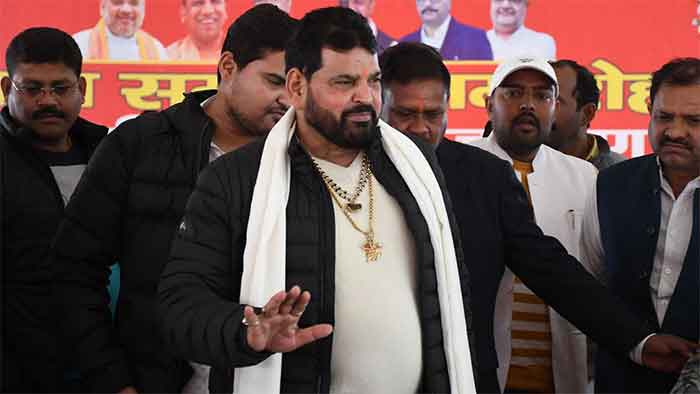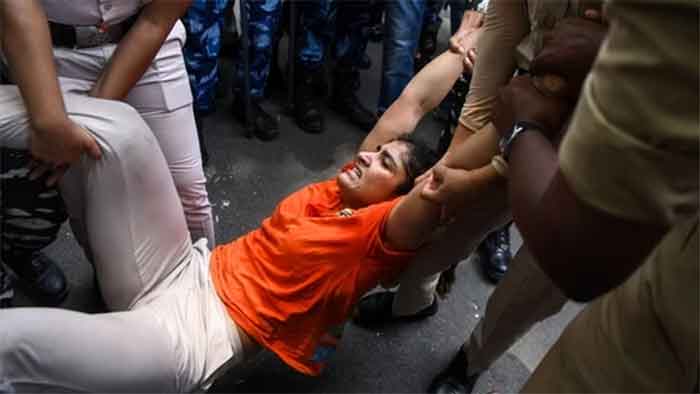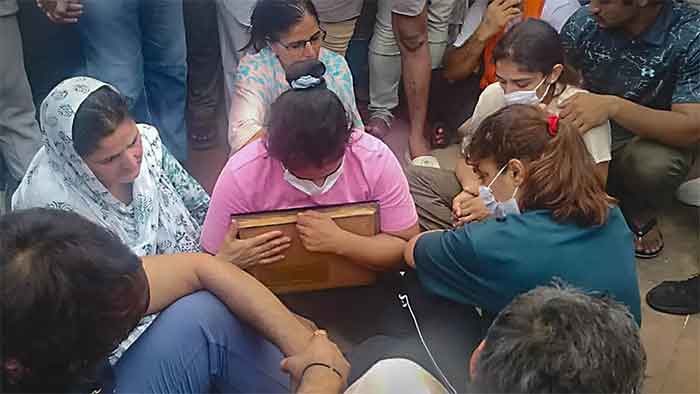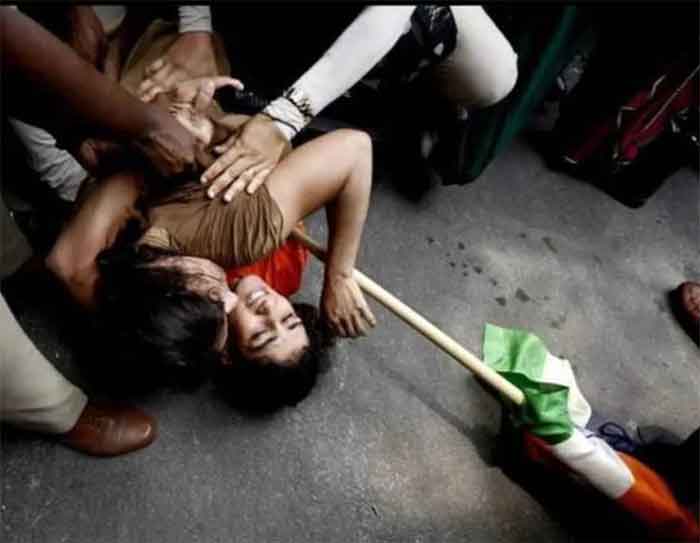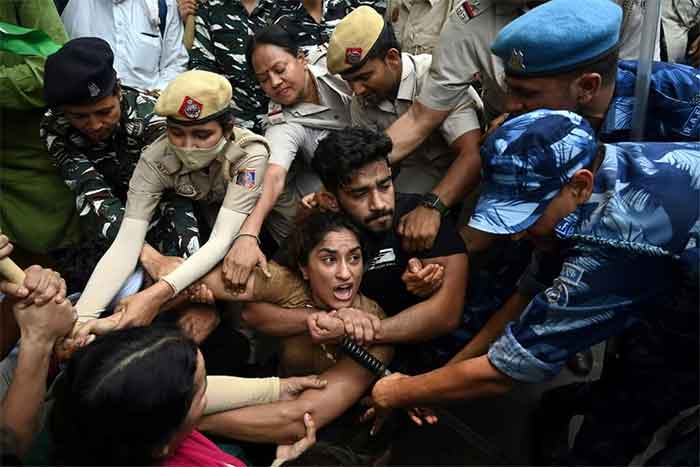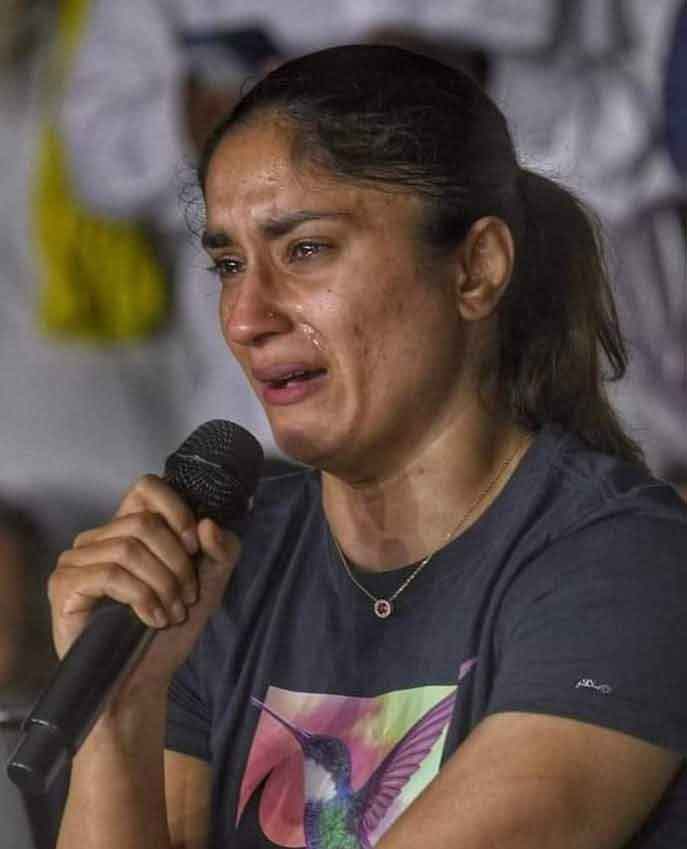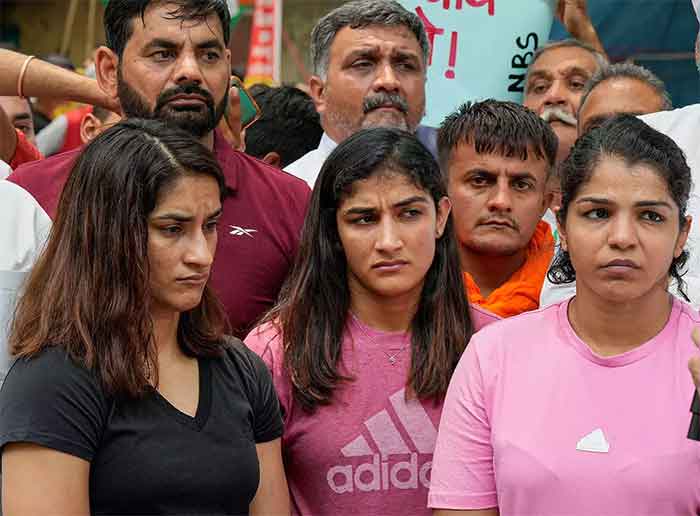
It has been weeks since some of the country’s best-known and most successful wrestlers have been on ‘dharna’ at Jantar Mantar, New Delhi, to voice their outrage against the highhandedness of the president of the Wrestling Federation of India, Brij Bhushan Sharan Singh, who also happens to be a high-profile six-time BJP member of parliament with multiple criminal cases pending against him. The wrestlers on ‘dharna’, who have had their water and electric connections disconnected by the Delhi Police and been refused the use of mattresses, have been asking for exemplary punishment against Singh. The controversial politician, who holds the Godda parliamentary seat in Uttar Pradesh, is known to enjoy the blessings of Adityanath and the protection of Amit Shah. Both have been deafeningly silent on the issue of alleged sexploitation of at least seven women wrestlers, including a minor.
In a sense, what has disappointed Olympic, Commonwealth or Asian Games medal-winning wrestlers like Vinesh Phogat, Sakshee Malik or Bajrang Punia who, between them, have emerged as the visible face of protest, the most is the role of former ‘role models’ like P. T. Usha, president of the Indian Olympic Association (IOA), or M. C. Mary Kom. Both these renowned sportspersons appear not to care about what people think of their siding with the oppressor as long as they are in the good books of the powers-that-be. Usha, a BJP-nominated Rajya Sabha member, roundly exposed herself when she publicly decried the decision of the wrestlers to sit on ‘dharna’, going to the extent of claiming that they had lowered the prestige of the country in the eyes of the world. Mary Kom, on her part, chose to be more artfully circumspect, using evasion to wriggle out of any discussion on the subject. Recently in Kolkata to receive an award from a reputed jewellery firm, she said she would open her mouth only if the press did not insist on getting her opinion on the Jantar Mantar furore. Mary Kom, too, has benefitted from her proximity to the BJP, having a term (2016-22) as a member of the Rajya Sabha.
Sakshee, a 2016 Rio Olympics bronze medalist, has been forthright in her denunciation of the opportunistic tendencies shown by the elders who had at some point in the past, been a source of inspiration to the young, the gifted and the ambitious in different fields of sports. Many of her country people are likely to agree with Sakshee when she says: “We are much better than people like P. T. Usha and Mary Kom. If former athletes such as them can’t support us, it’s a matter of shame. Such adversaries (acting like politicians) give no strength. We don’t want them to sit here (on dharna) with us. We just want them to be truthful and support us. We have already sacrificed our training and sport. But this cause (of getting the guilty punished) is bigger than all”.
Clearly, one has the feeling that the defiant young wrestlers are unlikely to settle for any compromise formula. Perhaps, their resolve will be strengthened by the way in which student and youth support is slowly but steadily growing. If the ‘dharna’ continues to be conducted in the democratic, almost statesmanlike manner in which it has been coordinated so far, one should not be surprised to find it taking on the character of the farmers’ agitation which badly rattled the BJP government and forced it to settle for a truce, the terms of which however are yet to be honoured. In this connection, it is to be noted that the wrestlers are of hardened peasant stock and, once roused to righteous fury by the wrongdoings of the privileged and the powerful, can be a determined lot. As much can be made out of their collective declaration that, if need be, they would go on hunger strike till the objectives of their fight are achieved.
Bajrang Punia could be said to be speaking for the entire aggrieved group when he asserted that they were ready to go to any extent; pay any price to get justice. “We want a complete clean-up of the WFI. People like (Brijbhushan) Singh and his aides should leave. I would say that getting justice for India’s daughters will be a bigger medal than the Olympics. This is not a tough struggle for us. We are straightforward, apolitical people. We are not even concerned about the corruption and financial wrongdoings in the federation, but sexual harassment is a non-negotiable issue”.
No one is likely to agree more with Punia’s statement that “sexual harassment is a non-negotiable issue” than the Booker Prize-winning writer Geetanjali Shree who has, unlike many of her compatriots, come out in open support of “India’s daughters” in danger. She could have chosen the sterile path of silence and misconceived safety, but did not. In a statement dated Saturday, 29th April, Geetanjali spoke out: “To obtain simple justice, our ace wrestlers, forsaking their work and security, have been forced to mount an agitation and to approach the Supreme Court. It is painful and a national shame. What as a people have we done to ourselves? Justice should be available as a matter of course and not require agitation and knocking at the Supreme Court’s door. Even a private person like me feels constrained to come out of my solitude and condemn this atrocity. That is to do with our “national treasures”, and to do with women, absolutely cannot let anyone be quiet”.
Those of my readers who have seen films dealing with wrestling from this or that part of Africa, would know that wrestling matches held in the most ancient continent on earth are supervised by singer-poets referred to as griots. Traditional singers memorializing heroes of the past or commenting on the woes of the present, griots are known to take on heroic postures or give vent to lamentations about human follies and failures. These rare subaltern artists are singers, dancers and fighters rolled into one, clad in flowing robes adding to their majestic presence. They regale and try to enlighten their spectators with words and gestures before a bout begins or between bouts.
When Geetanjali speaks of herself as a private person, given to solitude yet compelled to speak out on atrocities against women, in my imagination she transforms herself, albeit inadvertently, from a writer of distinction to a singer-poet of the popular classes; a conscience-keeper attending to the fate of “national treasures”; a griot of principles. Where Usha and Mary Kom have disgraced themselves in the present instance by agreeing to be willing agents of a corrupt and cruel dispensation for narrow personal gains, someone like Geetanjali has chosen to be by the side of the children of the akhra or the arenes (arenas), as wrestling pits are called in Dakar or Bamako.
Evan as I watch with pride, hope and trepidation the unfolding of the Jantar Mantar drama of resistance to many officially-sanctioned tyrannies, I am reminded of a prize-winning Senegalese film to do with wrestling seen at a festival in Zanzibar some 17 years ago. Again, my mind travels back to a Marathi film called Khwada (Obstacle) by Baburao Kharade, which won the Special Jury Prize at the national awards in 2015. Khwads, generally speaking, means ‘obstacle’ in Marathi, but in Kharade’s film it also refers to tactics adopted by a wrestler to destroy his opponent. The growing confrontation in Khwada between a cruel and grasping landlord (Brijbhushan Singh?) and a group of besieged shepherds (protesting wrestlers?) could easily be read as a metaphor for unbridled gangsterism matched by dogged resistance to it. The landlord cannot accept the humiliation of a shepherd boy humbling his trained wrestlers who he maintains as a symbol of socio-economic overlordship. Hence, the tyrant, having lost face before the villagers, tries to regain it by imposing oppressive methods on the brave shepherd lad and his family. Perhaps, it is possible to ‘read’ parallels between what happened fictionally in a remote Maharashtra village and ongoing real-life events in the national capital.
Wrestling, like archery, swimming, running or throwing the discus, has since time immemorial served as a compelling symbol for human excellence, embracing strength, skill and character. Wise and ancient cultures have looked upon wrestling in particular as an exalted endeavor made up in equal parts of the physical and the spiritual. The brave young people determinedly fighting the combined despotism of party, police and the Press, appear to have consciously engaged themselves in a seemingly long and tense battle to wrest a spiritual victory.
Vidyarthy Chatterjee is a film critic

